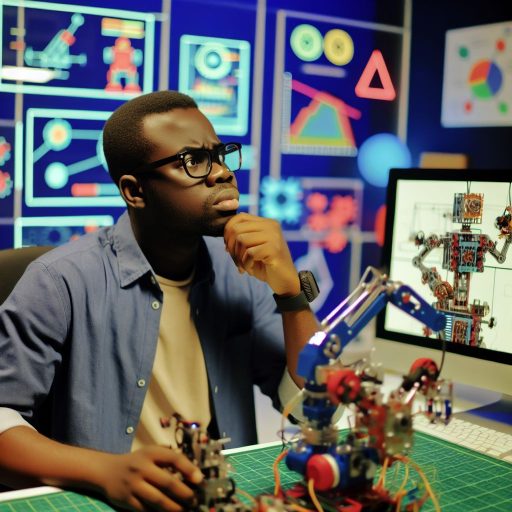Introduction:
A brief overview of Nigerian materials engineering education reveals a growing need for advancements in teaching methods and technologies.
Innovation in education is crucial for keeping pace with the rapidly evolving field of materials engineering.
Maintaining a curriculum that integrates new technologies and teaching methods is essential to preparing students for successful careers in materials engineering.
Current state of materials engineering education in Nigeria:
Materials engineering education in Nigeria faces several challenges that hinder the effective delivery of quality education to both institutions and students.
- Challenges faced by institutions and students
- Lack of modern equipment and technology
- Outdated curriculum and teaching methods
Challenges faced by institutions and students:
Institutions offering materials engineering programs in Nigeria encounter various obstacles that impede the smooth running of the educational process.
One major challenge is the inadequate funding allocated to these institutions, resulting in the lack of resources needed to enhance the quality of education provided.
This lack of funding leads to a scarcity of teaching materials, limited laboratory equipment, and insufficient faculty to adequately educate students in materials engineering.
Additionally, inadequate infrastructure, such as outdated classrooms and laboratories, makes it difficult for students to fully immerse themselves in practical learning experiences.
These challenges ultimately hinder students’ ability to gain a comprehensive understanding of materials engineering concepts and principles.
Lack of modern equipment and technology:
Another significant challenge plaguing materials engineering education in Nigeria is the lack of access to modern equipment and technology.
Many institutions are unable to afford state-of-the-art equipment and tools necessary for conducting research and practical experiments in materials engineering.
This limitation restricts students from gaining hands-on experience with advanced technologies and impedes their ability to develop innovative solutions to real-world engineering problems.
Furthermore, the absence of modern technology in materials engineering education inhibits students’ exposure to cutting-edge developments in the field.
As a result, graduates may lack the skills and knowledge required to compete in the rapidly evolving global engineering landscape.
Outdated curriculum and teaching methods:
The curriculum and teaching methods used in materials engineering education in Nigeria are often outdated and do not align with current industry standards and practices.
This disconnect between academia and industry deprives students of the opportunity to acquire relevant skills and knowledge that are essential for success in the field of materials engineering.
Moreover, the reliance on traditional teaching methods, such as lecture-based instruction, hinders students’ hands-on learning experiences and limits their ability to develop critical thinking and problem-solving skills.
To address these challenges, institutions must revise their curriculum to incorporate modern teaching techniques, practical training, and industry-driven projects that prepare students for the demands of the materials engineering profession.
Innovations in curriculum development:
- Integration of emerging materials and technologies
- Hands-on projects and practical experience
- Collaboration with industry partners for real-world applications
One of the key components in advancing materials engineering education in Nigeria is the continuous innovation in curriculum development.
By integrating emerging materials and technologies into the curriculum, students are exposed to the latest advancements in the field.
This prepares them for careers in a rapidly evolving industry.
Hands-on projects and practical experience are also essential in enhancing the learning experience of materials engineering students.
By working on real-world projects, students are able to apply their knowledge in a practical setting.
They gain valuable skills that will benefit them in their future careers.
Furthermore, collaboration with industry partners is crucial in bridging the gap between academia and the industry.
By working closely with industry experts, students gain insights into the real-world applications of materials engineering.
This helps them to better understand the practical implications of their studies.
These innovations in curriculum development play a significant role in shaping the future of materials engineering education in Nigeria.
This equips students with the knowledge and skills needed to succeed in a competitive and constantly evolving field.
You Might Also Like: Agricultural Engineering Internships: How to Find One
Technological advancements in materials engineering education:
– Use of virtual reality and simulations for learning
– Incorporation of 3D printing and additive manufacturing
– Online resources and digital platforms for remote learning
In today’s fast-paced world, technological advancements have made their way into every aspect of our lives, including education.
In the field of materials engineering, these advancements have significantly transformed the way students learn and interact with the subject matter.
In this section, we will explore some of the key technological innovations that have revolutionized materials engineering education in Nigeria.
Virtual reality and simulations for learning:
One of the most exciting developments in materials engineering education is the use of virtual reality (VR) and simulations.
VR technology allows students to immerse themselves in a virtual environment where they can explore complex concepts and experiment with different materials without the need for physical samples.
Simulations, on the other hand, provide a hands-on approach to learning by allowing students to interact with realistic scenarios and observe how materials behave under different conditions.
By incorporating VR and simulations into the curriculum, educators can enhance the learning experience and help students develop a deeper understanding of materials engineering principles.
Transform Your Career with Expert Guidance
Get personalized mentorship consulting that’s tailored to your unique path. Our expert advice is actionable and exclusive.
Get StartedIncorporation of 3D printing and additive manufacturing:
Another groundbreaking innovation in materials engineering education is the incorporation of 3D printing and additive manufacturing.
3D printing technology enables students to design and create physical models of complex structures and components, allowing them to visualize concepts in a tangible way.
Additive manufacturing, on the other hand, provides students with the opportunity to explore advanced manufacturing techniques and gain hands-on experience in creating functional parts using a variety of materials.
By integrating 3D printing and additive manufacturing into the curriculum, educators can ignite students’ creativity and innovation while preparing them for careers in the rapidly evolving field of materials engineering.
Online resources and digital platforms for remote learning:
With the rise of online education, materials engineering programs in Nigeria have increasingly turned to digital platforms and online resources to supplement traditional classroom instruction.
These platforms offer a wide range of educational materials, including lectures, tutorials, and interactive simulations, allowing students to access learning materials anytime, anywhere.
Additionally, online resources provide a platform for collaboration and communication among students and educators, fostering a sense of community and shared learning experience.
By leveraging online resources and digital platforms, materials engineering programs can reach a wider audience and provide students with flexible learning opportunities that cater to diverse learning styles and preferences.
Find Out More: Top Nigerian Universities Offering Metallurgical Engineering
Professional development opportunities:
– Workshops, seminars, and conferences for educators and students
– Internship programs with leading companies in the field
– Certification courses in specialized areas of materials engineering
Workshops, Seminars, and Conferences
One way to enhance materials engineering education in Nigeria is through workshops, seminars, and conferences.
These events provide a platform for educators and students to learn about the latest advancements in the field.
Workshops can focus on practical skills, such as hands-on training with new materials or equipment.
Seminars can delve into theoretical concepts or research findings.
Conferences offer networking opportunities and a chance to present research to a wider audience.
Internship Programs
Internship programs are another valuable way to bridge the gap between classroom learning and real-world applications.
By partnering with leading companies in the materials engineering industry, students can gain hands-on experience.
They can learn about industry trends and develop practical skills.
These programs also allow students to build professional connections and potentially secure employment after graduation.
Certification Courses
In addition to traditional academic coursework, certification courses in specialized areas of materials engineering can provide students with in-depth knowledge and skills.
These courses are designed to cover specific topics or technologies that are in high demand in the industry.
By obtaining certifications, students can enhance their credentials and improve their job prospects.
Professional development opportunities such as workshops, seminars, internships, and certification courses play a crucial role in advancing materials engineering education in Nigeria.
These opportunities provide educators and students with the tools and knowledge they need to succeed in a dynamic and evolving field.
Discover More: Professional Associations for Surveyors in Nigeria

Research and development initiatives:
One of the key factors driving innovations in Nigerian materials engineering education is the emphasis on research and development initiatives.
These initiatives play a crucial role in advancing the field and keeping up with global trends.
Government funding for research projects:
- The Nigerian government has allocated significant resources to fund research projects in materials engineering education.
- This funding enables researchers and scholars to conduct groundbreaking studies and experiments.
- It also provides students with opportunities to engage in hands-on research and gain practical experience.
Collaboration with international universities and research institutions:
- Nigerian materials engineering education institutions are increasingly collaborating with international universities and research institutions.
- These collaborations bring together diverse perspectives and expertise, leading to innovative research outcomes.
- Students and faculty members benefit from exposure to cutting-edge research practices and facilities.
Focus on sustainable materials and green technologies:
- With growing concerns about environmental sustainability, Nigerian materials engineering education has shifted its focus towards sustainable materials and green technologies.
- Researchers are exploring eco-friendly alternatives and innovative solutions to address environmental challenges.
- By integrating sustainable practices into materials engineering education, students are equipped to tackle real-world issues and contribute to a greener future.
Delve into the Subject: Marine Engineering: Innovations Shaping the Future
Significance of Continuous Innovation in Materials Engineering
The importance of continuous innovation in materials engineering education cannot be overstated.
By keeping up with advancements in the field, students are better equipped to tackle real-world challenges.
This dedication to improvement has the potential to greatly impact Nigeria’s economic growth and industrial development.
Skilled materials engineers are essential for driving innovation in various industries.
They play a vital role in creating new opportunities for growth.
Additional Resources
Fellowship program empowers Nigerian academics to transform …
Assessment of barriers to the adoption of innovative building …




